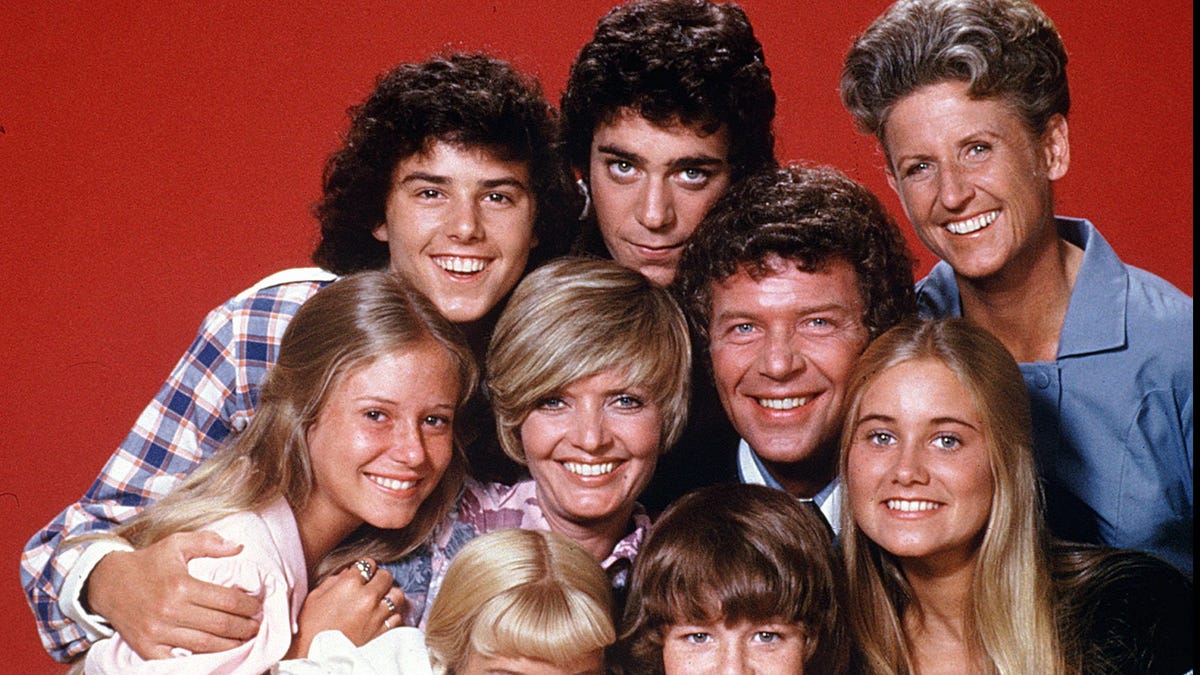A half-century ago, the fictional Carol Brady was living TV’s version of don’t ask, don’t tell.
She married Mike Brady and merged their families as “The Brady Bunch” (shown here with Alice, the housekeeper). He had three sons and was widowed; she had three daughters and, well … ???
The plan was for her to be divorced, said Lloyd Schwartz, a “Brady Bunch” producer and the son of creator Sherwood Schwartz. ABC said no. “Divorce was a taboo topic on television, so they said, ‘Let’s just leave it so you don’t know.’”
Schwartz relates that in “History of the Sitcom,” which CNN airs at 9 p.m. Sundays. Its two-hour opener (July 11) offered a quick, slick ride through depictions of family and sexuality.
There’s a lot of ground to cover. When “Brady Bunch” began in 1969, divorce was unmentionable; when “Maude” arrived three years later on CBS, Maude was on her fourth marriage.
And bigger matters followed. Consider TV critic Jim Colucci’s comments in the CNN episodes.
There was the moment he saw “All in the Family,” with its intense political/social debates. It felt, he said, like “the ground under me is shaking.” And the 1997 moment when the “Ellen” character came out as gay. “It was a pivotal moment on television.”
CNN’s series comes at a time when sitcoms are in a slump. For instance:
– As the 1997 season began, the networks had 60 sitcoms; this fall, cartoons excluded, they’ll have 10.
– In ‘97, NBC dominated with 18 sitcoms. It will start this fall with zero.
– At one point, WB and UPN combined for 11 sitcoms with Black leads. Now those two have merged into CW, which closed its comedy division. Overall this fall, broadcast will have three Black sitcoms.
– Sitcoms sometimes dominated the Nielsen ratings. They were the top seven in 1974-75, nine of the top 10 in ‘78-79. This past season, there were none in the top 10, one (“Young Sheldon”) in the top 30.
So this might be an odd time to be ponder sitcoms … or the perfect time to reflect on their history.
Back in 1949, TV had three sitcoms based on radio shows and one based on a movie. They may have been fairly primitive, but “I Love Lucy” arrived just two years later and soared.
Mostly, TV depicted trouble-free times. “It was a happy, gentle America” on the screen, Candice Bergen says in the CNN series. The extreme, perhaps, was “Father Knows Best,” with nine seasons of what Colucci calls “an idealistic version of America.”
Disrupting this version was Norman Lear, who adapted a British show about a bigoted dad and his strident son-in-law. He made two pilot films for ABC, both rejected; then CBS jumped in.
Lear made a third pilot – “same script; I wouldn’t change a word.” Each version recast the daughter and son-in-law; the third duo – Sally Struthers and Rob Reiner – scored. “All in the Family” was No. 1 in the Nielsen ratings for five years.
Lear’s comedy factory (“Jeffersons,” “Maude,” “Good Times”) blended with the MTM ones (“Mary Tyler Moore,” “Rhoda,” “Phyllis”) to create TV’s first golden age of comedy. As they faded, the Garry Marshall shows (“Happy Days,” “Laverne and Shirley,” “Mork and Mindy”) took over.
Then things sagged. “The situation comedy, in general, had been pronounced dad,” Colucci said.
But “The Cosby Show” arrived in 1984, scoring instantly. NBC put it on Thursdays, leading into some clever comedies that viewers had been overlooking. By 1986-87, “Cosby,” “Family Ties” and “Cheers” had the top three spots in the Nielsen ratings.
In the CNN film, people offer no praise for Bill Cosby as a person, but grant that his show was huge. “We got Super Bowl ratings every single week,” said co-star Malcolm-Jamal Warner.
That sparked the second golden age, when NBC had “Seinfeld,” “Friends,” “Frasier,” “Mad About You” and more, including “Will & Grace,” which put gay characters at the core.
“Seinfeld” left in 1999; others followed. In 2004, Entertainment Weekly asked: “Are sitcoms dead?”
They weren’t, because “Big Bang Theory” and “Modern Family” came in 2007 and 2009. Now they’re gone and sitcoms are dying again. While we wait for a rebirth, CNN offers some golden memories.
